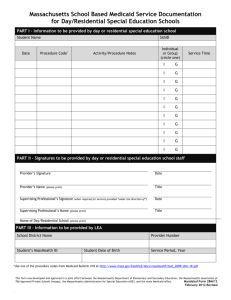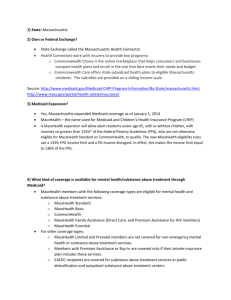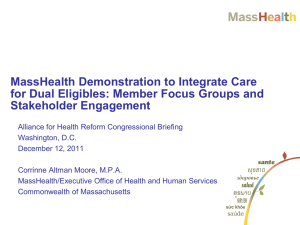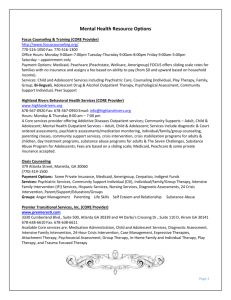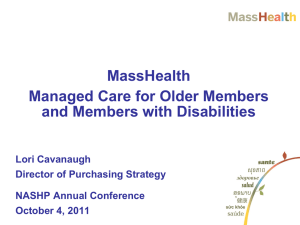1) State: Massachusetts 2) Own or Federal Exchange? State
advertisement
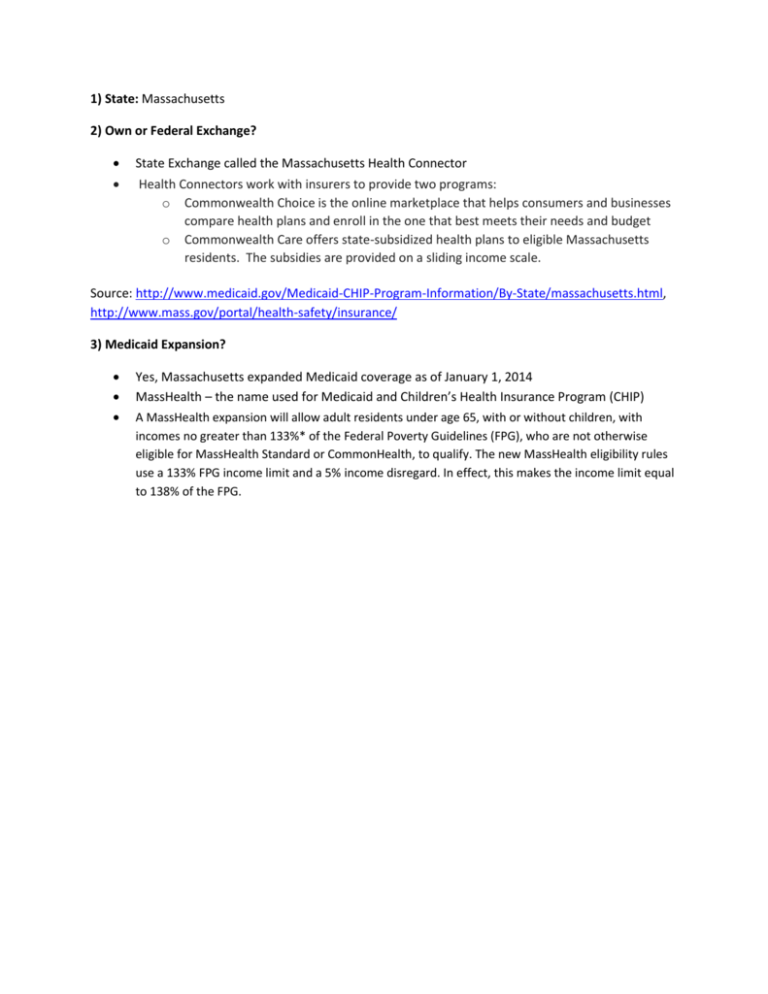
1) State: Massachusetts 2) Own or Federal Exchange? State Exchange called the Massachusetts Health Connector Health Connectors work with insurers to provide two programs: o Commonwealth Choice is the online marketplace that helps consumers and businesses compare health plans and enroll in the one that best meets their needs and budget o Commonwealth Care offers state-subsidized health plans to eligible Massachusetts residents. The subsidies are provided on a sliding income scale. Source: http://www.medicaid.gov/Medicaid-CHIP-Program-Information/By-State/massachusetts.html, http://www.mass.gov/portal/health-safety/insurance/ 3) Medicaid Expansion? Yes, Massachusetts expanded Medicaid coverage as of January 1, 2014 MassHealth – the name used for Medicaid and Children’s Health Insurance Program (CHIP) A MassHealth expansion will allow adult residents under age 65, with or without children, with incomes no greater than 133%* of the Federal Poverty Guidelines (FPG), who are not otherwise eligible for MassHealth Standard or CommonHealth, to qualify. The new MassHealth eligibility rules use a 133% FPG income limit and a 5% income disregard. In effect, this makes the income limit equal to 138% of the FPG. Source: http://www.massresources.org/health-care-2014.html#changes2014, http://www.medicaid.gov/AffordableCareAct/Medicaid-Moving-Forward-2014/Downloads/Medicaidand-CHIP-Eligibility-Levels-Table.pdf 4) In all cases – need to designate if rules are associated with Federal or State mandates/coverage 5) What are Medicaid eligibility criteria? To be eligible for one of the coverages of MassHealth (either Medicaid or CHIP) you 1) must be a Massachusetts resident, 2) in most cases, you must meet financial eligibility requirements (explained below), and 3) meet one or more of the categories below: o a family living with children under the age of 19 years o o o o a pregnant woman with or without children a person who is long-term unemployed a disabled person an adult who is working for a qualified employer o o o o o o o a person who is HIV positive a child under the age of 19 years an adult caretaker relative living with children under 19 years of age when neither parent is living in the home elderly (65 or older) a woman with breast or cervical cancer a person in need of long-term care a young adult under age 21 who was in the care and custody of the Department of Children and Families (DCF/DSS) on his/her 18th birthday Financial eligibility requirements for MassHealth: o Asset limit: For most applicants under 65, there are no asset limits. For most people over 65 and older, and people who are institutionalized or who would be institutionalized without community-based services, there is an asset limit: Countable assets cannot be greater than $2000 for an individual and $3000 for a couple for MassHealth Standard, Essential, or Limited Countable assets cannot be greater than $7080 for an individual and $10,620 for a couple for MassHealth Assets that are not counted include: one car per household, if certain conditions are met your house if it is in Massachusetts assets of anyone receiving SSI funeral or burial arrangements (may be limited) certain other noncountable assets Assets that are counted include: other vehicles other real estate cash, bank accounts, securities pensions, annuities, retirement accounts There are special asset rules for people who are institutionalized or would be institutionalized without community-based care. Sources: http://www.massresources.org/masshealth-general-eligibility.html, http://aspe.hhs.gov/poverty/14poverty.cfm 6) What kind of coverage is available for mental health care? MassHealth members with the following coverage types are eligible for mental health and substance abuse treatment services: o MassHealth Standard o MassHealth Basic o CommonHealth o MassHealth Family Assistance (Direct Care, and Premium Assistance for HIV members) o MassHealth Essential For other coverage types: o MassHealth Limited and Prenatal members are not covered for non-emergency mental health or substance abuse treatment services. o Members with Premium Assistance or Buy-In are covered only if their private insurance plan includes these services. o EAEDC recipients are covered for substance abuse treatment services at public detoxification and outpatient substance abuse treatment centers. To be covered by MassHealth, mental health services must be medically necessary and must be provided by health care professionals who meet MassHealth requirements. There are some limits on the length and frequency of services (shown on website). Covered mental health services include: o diagnostic services and psychological testing o short-term and long-term therapy o o o o o o individual, couple, family, and group therapy medication visits consultations crisis intervention and emergency services home visits care coordination All approved plans regardless of Federal or State-run Exchanges must cover the same package of benefits, called essential health benefits. In Massachusetts, the benefits through Massachusetts Health Connector include: 1. Outpatient services, such as doctor visits or tests done outside a hospital. This includes fertility treatments. 2. Emergency services 3. Hospital stays, including weight loss surgery 4. Pregnancy and baby care 5. Mental health and substance abuse services, including behavioral health treatment 6. Prescription drugs, including generic and certain brand-name drugs 7. Rehab and habilitative services, those that help people recover from an accident or injury and those that help people with developmental issues. In Massachusetts, this includes physical and occupational therapy for people diagnosed with autism spectrum disorder, those who have home health care, and those with speech/hearing disorders. 8. Lab tests 9. Preventive and wellness services, along with those that help people manage chronic conditions. This includes contraceptives, hormone replacement therapy, and wigs for people who are balding. 10. Services for children, including dental and eye care (but not eyeglasses) Source: http://www.massresources.org/masshealth-behavioral.html#mentalhealth, http://www.webmd.com/health-insurance/ma/massachusetts-health-insurance-marketplace?page=2 7) What kind of coverage is available for substance abuse treatment? To be covered by MassHealth, substance abuse treatment services must be provided by programs licensed or approved by the Massachusetts Department of Public Health. The following services are covered: o methadone treatment programs o acute inpatient substance abuse treatment services o substance abuse outpatient counseling, case consultation, and acupuncture detoxification o special services for pregnant women, including intensive outpatient services, enhanced inpatient services, case management, and day treatment The Division (of MassHealth) pays only for the following services furnished by substance abuse treatment programs, in accordance with the regulations of the Massachusetts Department of Public Health: (A) the following services provided by freestanding methadone treatment programs, including methadone detoxification and methadone maintenance programs: (1) the administration and dispensing of methadone; and (2) individual, group, and family/couple counseling; (B) services provided by acute inpatient substance abuse treatment services providers for the treatment of substance dependency; (C) the following substance abuse outpatient counseling services: (1) individual, group, and family/couple counseling; (2) case consultation; and (3) acupuncture detoxification, which includes acupuncture treatments and motivational and supportive services; and (D) the following special substance abuse treatment services for pregnant recipients: (1) intensive outpatient program services for pregnant recipients; (2) day treatment for pregnant recipients; (3) enhanced acute inpatient substance abuse treatment services for pregnant recipients (4) case management for pregnant recipients Source: http://www.massresources.org/masshealth-behavioral.html#mentalhealth, http://www.mass.gov/eohhs/docs/masshealth/regs-provider/regs-substanceabuse.pdf 8) Does the state allow the court to order treatment and still have it paid by Medicaid? The court can order treatment and have it paid by Medicaid if the services are covered by MassHealth shown in question #7. If the person is not currently covered by Medicaid, he/she will need to apply and will become covered within 90 days if they are eligible. 9) What happens to the health care coverage when a participant is sanctioned to jail (not prison)? How many days can someone be incarcerated before s/he loses their coverage? Federal health programs will not pay for your care, but jails and prisons are responsible for providing essential health and mental health services to all inmates. You have a constitutional right to treatment while in jail or prison and can request it. Medicaid does not pay for any services while you are in jail or prison. Many states will take your name off their Medicaid list when you are incarcerated and you will have to re-apply when you are out of jail. Detainees may apply for Medicaid and CHIP at any point. However, if determined eligible for Medicaid, eligibility must be suspended while incarcerated, and health care services cannot be covered by Medicaid until release, except for off-site inpatient medical care lasting 24 hours or more. Federal Medicaid law and the regulations promulgated by the Centers for Medicare and Medicaid Services (CMS) govern when and how individuals both lose access to federal Medicaid when they are incarcerated and when full coverage can be restored or established for released inmates. These rules are quite complex and are intertwined with rules of other federal benefit programs. Medicaid law requires a discontinuation of federal payment for services (known as federal financial participation, or FFP) once an individual is in a public institution, including a jail or prison. However, federal rules on Medicaid eligibility are different from those governing federal payment for services. While the law prohibits federal payment for services furnished to anyone incarcerated in jail or prison, it does not require that individuals lose their Medicaid eligibility. Individuals can retain their status as a Medicaid-eligible person while in jail or prison. States must use appropriate administrative measures to ensure that no Medicaid claims are filed with the federal government while the individual is incarcerated, but they can temporarily suspend an eligible individual from payment status without terminating them totally from the program. In addition, before terminating someone, states must meet certain federal requirements: o States must continue Medicaid to all eligible individuals “until they are found ineligible.” o A state cannot terminate an individual from Medicaid until it has conducted a redetermination of their eligibility, including an ex-parte review. o States “have an obligation under federal law to ensure that their computer systems are not improperly denying enrollment in, or terminating persons from Medicaid. Source: ACA Jails pdf, http://www.kitsapgov.com/pubdef/Forms/LinkClick.Benefits.pdf, http://www.bazelon.org/LinkClick.aspx?fileticket=_Ns68MefCJY%3D&tabid=441 10) What happens to an individual’s coverage when they get a new job? (Or lose a job?) Are there any “grace periods” of coverage? If a person has insurance through the Marketplace, getting or losing a job will not affect an individual’s coverage. The person will need to update their information on the Marketplace when changes occur because subsidies will be adjusted. If a person has insurance through their job and lose the job, COBRA continuation coverage may be available. COBRA, which generally applies to employers with 20 or more employees, allows the individual and his/her family to continue the same group health coverage. An individual’s cost for coverage may be higher than what the individual was paying before (and is usually higher than the cost for coverage under special enrollment in a spouse’s plan), but generally the cost is lower than that for private, individual health insurance coverage. The plan should send a notice regarding the availability of COBRA coverage. After this notice is provided, the individual generally has 60 days to elect coverage and it is then available retroactive to the loss of coverage. COBRA coverage typically lasts 18 months, but may last longer in certain circumstances. Once someone is enrolled in Medicaid, they must renew their eligibility at least once a year or when there is a change in their circumstances, such as an increase or decrease in any public assistance. Source: http://www.dol.gov/ebsa/newsroom/fsjobloss.html 11) Are there restrictions related to treatment providers for probationers, substance abuse, or mental health treatment? Will only certain providers be covered? Restrictions for substance abuse: o There are limits on the length and frequency of counseling, consultation, and acupuncture detoxification sessions. (A) Methadone Treatment Programs. (1) Payment for administering or dispensing methadone is limited to one dose per recipient per day. Payment for dispensing a take-home supply is limited to a maximum six days’ supply. (2) Payment for counseling services is limited to four sessions (individual, group, or family/couple) per recipient per week. (B) Acute Inpatient Substance Abuse Treatment Services. The Division will pay for acute inpatient substance abuse treatment services delivered in conformance with the standards and patient placement criteria issued and enforced by the Massachusetts Department of Public Health’s Bureau of Substance Abuse Services. (C) Substance Abuse Outpatient Counseling Programs. (1) Counseling. Payment for counseling services is limited to a maximum of 24 sessions (individual, group, or family/couple) per recipient per calendar year. (2) Case Consultation. (a) The Division will pay a provider only for case consultation that lasts at least 30 minutes. Payment is limited to a maximum of one hour per session, once every three months. (b) The Division will pay for case consultation only when telephone contact, written communication, and other nonreimbursable forms of communication clearly will not suffice. Such circumstances must be documented in the recipient’s record. Such circumstances are limited to situations in which both the substance abuse treatment provider and the other provider are actively involved in treatment or management programs with the recipient (or family members) and where a lack of face-to-face communication would impede a coordinated treatment program. (c) The Division will not pay for court testimony. (3) Acupuncture Detoxification. (a) The Division will pay for outpatient acupuncture detoxification sessions, which may include acupuncture treatments and motivational and supportive services. A provider may not bill separately for these components. (b) Acupuncture treatments must be performed by an acupuncturist licensed by the Massachusetts Board of Registration in Medicine in a substance abuse outpatient facility licensed by the Massachusetts Department of Public Health. (c) Payment for acupuncture detoxification sessions is limited to a maximum of six treatments per recipient per week for the first two weeks and a maximum of three treatments per recipient per week thereafter. Each session must last at least 45 minutes and no more than 60 minutes. (d) All recipients seeking acupuncture detoxification services must be screened to ensure that acupuncture treatment is not medically contraindicated. If the screening determines that acupuncture treatment is medically contraindicated, the provider should assist the individual in obtaining an alternative form of treatment. The screening may be performed by a physician assistant, a nurse practitioner, or a registered nurse. The recipient is appropriate for acupuncture detoxification services if the screening determines that the recipient: (i) has no history of seizures, delirium tremens, or other life-threatening withdrawal symptoms; and (ii) is oriented to time, place, and person Source: http://www.massresources.org/masshealth-behavioral.html#mentalhealth, http://www.mass.gov/eohhs/docs/masshealth/regs-provider/regs-substanceabuse.pdf 12) Can treatment courts designate or select particular providers -ie those with experience and good reputations treating substance-addicted probationers? A team of court staff and mental health professionals works together to develop treatment plans and are primarily responsible for overseeing operations of the program and managing supervision of the drug court participants. The providers must meet all of the requirements from #14. Source: https://www.ncjrs.gov/pdffiles1/bja/205621.pdf 13) Is there coverage for residential substance abuse treatment? What are the parameters? Yes, MassHealth pays for services provided by acute inpatient substance abuse treatment services providers for the treatment of substance dependency. The Division will pay for acute inpatient substance abuse treatment services delivered in conformance with the standards and patient placement criteria issued and enforced by the Massachusetts Department of Public Health’s Bureau of Substance Abuse Services. Source: http://www.mass.gov/eohhs/docs/masshealth/regs-provider/regs-substanceabuse.pdf 14) What is the process and what are the regulations for treatment providers to be able to participate? The eligibility requirements for providers of substance abuse treatment services are as follows. (A) In State. The following requirements apply when the provider is located in Massachusetts. (1) Methadone Treatment Program. A provider who furnishes methadone detoxification and methadone maintenance services must be licensed as a methadone treatment program by the Massachusetts Department of Public Health under its regulations at 105 CMR 750.000. (2) Acute Inpatient Substance Abuse Treatment Services. A provider who furnishes acute inpatient substance abuse treatment services must be licensed or approved, or both, as a provider of acute inpatient substance abuse treatment services by the Massachusetts Department of Public Health pursuant to its regulations at 105 CMR 160.000 and 161.000. (3) Substance Abuse Outpatient Counseling Program. A provider who furnishes substance abuse outpatient counseling services must be licensed by the Massachusetts Department of Public Health to provide such services under its regulations at 105 CMR 162.000. These services include counseling services and acupuncture detoxification. (4) Special Services for Pregnant Members. A provider who furnishes intensive outpatient, day treatment, or case management services must be approved by the Massachusetts Department of Public Health to provide each of those services under its regulations at 105 CMR 162.000. A provider who furnishes enhanced acute inpatient substance abuse treatment services must be approved by the Massachusetts Department of Public Health to provide such services under its regulations at 105 CMR 160.000 and 161.000. (B) Out of State. To participate in MassHealth, an out-of-state substance abuse treatment program must obtain a MassHealth provider number and meet the following criteria: (1) the program must be licensed as a methadone treatment program, acute inpatient substance abuse treatment program, or substance abuse outpatient counseling program by the appropriate state agency under whose jurisdiction it operates; (2) the program must participate in its own state’s Medical Assistance Program or its equivalent; (3) the program must have a rate of reimbursement established by the appropriate rate setting regulatory body of its state; and (4) the program must be one that recipients in a particular locality use for medical services as a general practice. Source: http://www.mass.gov/eohhs/docs/masshealth/regs-provider/regs-substanceabuse.pdf 15) Is dental care covered? MassHealth: o o MassHealth dental benefits for adults (21 or older) include: complete checkup (once with each new dental provider) regular checkups (twice per 12-month period) cleanings (twice per 12-month period) radiographs (X-rays) extractions emergency dental care certain types of oral surgery (such as biopsies) composite fillings for the 12 teeth at the front of the mouth starting in 2014, fillings for all teeth The Massachusetts legislature has approved MassHealth coverage for adult dental fillings in the 2014 budget, but has not restored full dental benefits for adults. Starting in 2014, MassHealth Dental for adults will cover diagnostic and preventive services (such as checkups, cleanings, and x-rays), extractions, emergency treatment, and all dental fillings. Massachusetts Health Connector (Marketplace): o Dental care is an option, but is not included in the basic plan (except for children). Up to $3,000 is provided for dental care due to accidental injury NOT related to chewing/biting. Source: http://www.massresources.org/health-care-2014.html#masshealthdental 16) What is the basic primary medical care coverage? Are well-women check-ups included? Is birth control included? Well-women check-ups and contraceptives are included for all states, regardless if the exchange is Federal or State-run. All Qualified Health Plans (through the Marketplace) must include 10 essential benefits: 1. Outpatient services, such as doctor visits or tests done outside a hospital. This includes fertility treatments. 2. Emergency services 3. Hospital stays, including weight loss surgery 4. Pregnancy and baby care 5. Mental health and substance abuse services, including behavioral health treatment 6. Prescription drugs, including generic and certain brand-name drugs 7. Rehab and habilitative services, those that help people recover from an accident or injury and those that help people with developmental issues. In Massachusetts, this includes physical and occupational therapy for people diagnosed with autism spectrum disorder, those who have home health care, and those with speech/hearing disorders. 8. Lab tests 9. Preventive and wellness services, along with those that help people manage chronic conditions. This includes contraceptives, hormone replacement therapy, and wigs for people who are balding. 10. Services for children, including dental and eye care (but not eyeglasses) Source: http://www.webmd.com/health-insurance/ma/massachusetts-health-insurancemarketplace?page=2 18) How does family member coverage work? Go to the healthcare.gov website, choose your state, will take you to Massachusetts Health Connector website, apply for family coverage. All of the plans will cover the 10 essential benefits listed above. On the first step, if you and your family is not eligible for subsides through the Health Connector website, it will take you to MassHealth Medicaid website to apply for family coverage. Because Massachusetts expanded Medicaid, there will not be anyone who falls into the coverage gap. Source: www.healthcare.gov
